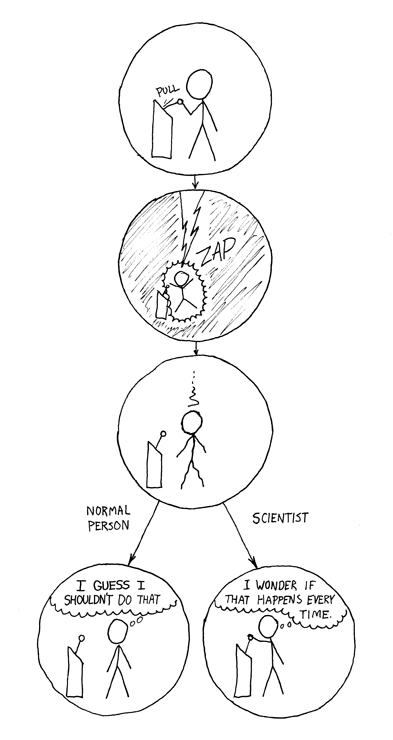Well, this is certainly an edifying thread. I can't say I read every post, but I think I got the gist. I would agree with the point that certain posters could do with a course in Epistemology 101. I wasn't overly impressed with
Philosophical Foundations for a Christian Worldview by J. P. Moreland and William Lane Craig, but it would clear up a lot of the confusion on the part of certain posters if they were willing to spend $50. A refresher course in the Ad Hominem Fallacy might be in order as well.
Ken Ham and his ilk are simply an embarrassment to Christianity. I enjoy listening to Ken. He's sincere and fun in a goofy way. I listen every Saturday to The Christian Worldview, where the host has lots of intelligent, worthwhile things to say but insists you aren't a "Bible-believing Christian" if you think the earth is older than 6,500 years. These well-meaning folks make fools of themselves and make Christianity a laughingstock in the eyes of people who might be inclined to take it more seriously if they weren't hearing this sort of nonsense.
It's a category mistake to treat the Bible as a scientific treatise. There was an original Star Trek episode in which a civilization was using an old copy of the Manhattan Yellow Pages as its scripture. Kirk and his crew tried to patiently explain what a telephone book actually was. The Ken Hams of the world are making a similar mistake.
The Ken Ham approach also exemplifies what I believe is one of the single greatest threats to Christianity today: bibliolatry. The Bible is literally worshipped as something it was never intended to be and in a way it was never intended to be. Bibliolatry is seemingly becoming the litmus test of a "true Christian."
God created a universe that is orderly and susceptible to investigation, analysis and (to a considerable degree) explanation. He blessed humans with minds and senses uncannily suited to such investigation and analysis. As the proponents of Intelligent Design emphasize, such investigation and analysis increasingly points toward a Creator. If it also points to the universe being something like 14 billion years old and the earth being nearly 5 billion years old to a level of scientific certainty, as it does, why should any Christian resist this reality because a wooden reading of Genesis or some wacky calculation by Bishop Ussher suggests the scientific data is off by a factor of 707,692 (my quick calculation of the actual age of the earth divided by Ussher's figure)?
Scientism (worship of science) is, of course, little different from bibliolatry. It's the antithesis of real science. I have studied the evolution debate quite intensively. If evolutionary theory had been established to the same level of scientific certainty as the age of the universe and the earth, I would have no theological objection. There is certainly some evidence supporting aspects of evolutionary theory. As a comprehensive explanation for the existence of modern homo sapiens, however, I believe (along with many experts across many scientific disciplines) that current evolutionary theory is deeply flawed and almost certainly false.
A book that I found fascinating, and that accords with what I have always intuitively suspected, is
The Genealogical Adam and Eve: The Surprising Science of Universal Ancestry by S. Joshua Swamidass. The basic thesis is the special creation of Adam and Eve something like 20,000 years ago, when the record begins to show astonishing leaps in human sophistication. All humans are genetic descendants of this pair. As unlikely as this may sound at first blush, its scientific viability has been acknowledged even by those who would love to ridicule it as nonsense. It's well worth reading, far superior (IMO) to William Lane Craig's effort to square creation with evolutionary theory in his recent book,
In Quest of the Historical Adam.






